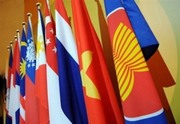Nay Pyi Taw – Bridging the Development Gap: ASEAN Equitable Development Monitor 2014 publication was presented today to ASEAN leaders at the 25th ASEAN Summit in Nay Pyi Taw, Myanmar. The Monitor provided a common basis for understanding trends in equitable development across the region and identifying areas for priority action through the use of macro and micro indicators.
The Monitor tracks indicators across two broad sets of economic and human development outcomes and policies. It is designed to facilitate further discussion on policies and programmes that can promote inclusive growth within ASEAN Member States and across the ASEAN Community. It is also aimed at operationalizing the ASEAN Framework on Equitable Economic Development (AFEED).
Over the past 15 years, faster growth in the poorest countries of ASEAN has enabled limited convergence in living standards. The Monitor demonstrates that child mortality rates have been cut by two-thirds across ASEAN and net primary school enrolment rates have risen in most Member States, particularly in the poorest ones. In addition, progress in improving health services and access to clean water and sanitation for citizens in the poorest ASEAN Member States has helped reduce child and infant mortality.
The Monitor shows that despite the progress, much remains to be done to ensure that the poorest members of the ASEAN Community—within countries and across countries—are not left behind as ASEAN integrates further. Development gaps are still prevalent. The average income in the richest ASEAN Member State is more than 45 times that of the poorest, even adjusting for differences in purchasing power.
Significant differences still remain across countries at higher levels of education as well as in the quality of education. In many low- and middle-income ASEAN countries, poor women in rural areas also generally have limited access to skilled birth attendants. Large disparities also persist in access to electricity and the use of solid fuels, particularly between rural and urban areas in the poorest countries of ASEAN.
The AFEED was adopted by ASEAN Leaders on 17 November 2011 in Bali, Indonesia. It underlines ASEAN’s commitment to further enhance the third pillar of the ASEAN Economic Community (AEC) Blueprint on equitable economic development so as to provide ASEAN citizens with equal opportunities to benefit from regional economic integration.
The Monitor was developed through technical assistance from the World Bank.

